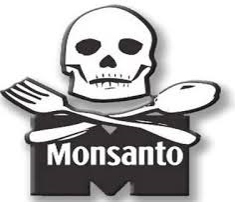 Four Nebraskans diagnosed with cancer have filed a lawsuit against Monsanto. The four – three farmers and an agronomist – accuse the chemical giant of misleading the public about the dangers of glyphosate.
Four Nebraskans diagnosed with cancer have filed a lawsuit against Monsanto. The four – three farmers and an agronomist – accuse the chemical giant of misleading the public about the dangers of glyphosate.Monsanto markets glyphosate, the active ingredient in Roundup, as being able to kill nearly every weed while alive without harming people (quite a feat if it could possibly be true). Glyphosate is sold alongside Roundup Ready seeds, which are engineered to withstand the pesticide.
More than 90 percent of soybeans and some 80 percent of U.S.-grown corn comes from Roundup Ready seeds.
Monsanto Roundup Cancer Problem
In March 2015, the World Health Organization’s International Agency for Research on Cancer labeled glyphosate as a probable cause of cancer. The WHO said glyphosate is linked to non-Hodgkin’s lymphoma and other haematopoietic cancers, including lymphocytic lymphoma, chronic lymphocytic leukemia, B-cell lymphoma.
Farmers are those most at risk, said the WHO, along with farm workers and others regularly exposed to Roundup and glyphosate.
Roundup and Non-Hodgkin’s lymphoma
The four Nebraskans who filed the lawsuit in U.S. District Court in May 2016 in Lincoln have all been diagnosed with non-Hodgkin’s lymphoma.
The lawsuit charges that, “(Monsanto) concealed or systematically sought to discredit” research showing a link between glyphosate. It also charges that Monsanto continues to mislead the public.
The lawsuit reads: “Monsanto championed falsified data and has attacked legitimate studies that revealed Roundup’s dangers. Monsanto led a campaign of misinformation to convince government agencies, farmers and the general population that Roundup is safe. Its continuing denial extends to the date of this Complaint.”
Monsanto Response
Monsanto on its web site claims that labeling glyphosate as a possible carcinogen conflicts with the consensus of regulatory bodies and science organizations, such as the U.S. EPA.
Monsanto’s web site claims: “’Probable’ does not mean that glyphosate causes cancer; even at 100 times the exposure that occurs during normal labeled use glyphosate is not a human health risk.”
Glypohosate works by inhibiting an enzyme essential for plant growth. Monsanto says that because that enzyme isn’t present in humans or animals, glyphosate is safe when used according to label directions.
The problem, as others have pointed out in lawsuits and elsewhere, is that enzyme IS in the human gut; therefore, Monsanto’s claim is blatantly false. Flora and fauna in the human gut are targeted and attacked the same way glyphosate attacks weed life. To that end, Monsanto faces lawsuits in California for false advertising.
Monsanto was found guilty in France for falsely advertising glyphosate.
Countries Ban or Restrict Glyphosate
Since being classified as a possible carcinogen by the International Agency for Research on Cancer (IARD), several countries have banned or restricted the sale of glyphosate, including the Netherlands, France, Bermuda, and Sri Lanka, where an epidemic of kidney disease in farmers has been blamed on glyphosate.
Monsanto, meanwhile, is suing the state of California in the hopes of keeping toxic glyphosate off the state’s list of known carcinogens, something the state must do as a matter of law, now that glyphosate has been declared carcinogenic.
Nebraska Farmers sue Monsanto in Cancer Lawsuit
Plaintiffs in the Nebraska case include farmers Larry Domina and Robert Dickey of Cedar County; York County farmer Royce Janzen; Dodge County agronomist Frank Pollard.
Similar lawsuits have been brought against Monsanto by agricultural workers in other states, including California and Delaware.
Related
- Monsanto Lawsuit
- Monsanto sued for False Advertising
- Lincoln Journal Star: Farmers sue Monsanto
- Sri Lanka bans Glyphosate amid Tragic Kidney Disease Outbreak
- BBC: Monsanto Guilty in False Ad Row

by Matthews & Associates




